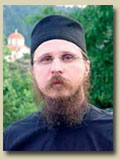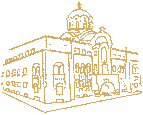| Information
Service of
the Serbian Orthodox Church
Avgust
10, 2005


COMMUNIQUE
OF THE HELSINKI COMMITTEE FOR HUMAN RIGHTS IN SKOPLJE
On
August 9, 2005, the Helsinki Committee for Human Rights in
Skoplje
issued a Press Release entitled "On the Desecularization
of the Republic of Macedonia" most strongly objecting to
any form of restriction of the freedom of belief and religion.
The Helsinki Committee called upon the state to abide by both
the international documents it had accepted and the Constitution
of the Republic of Macedonia, according to which: the restriction
of the freedoms and rights, even in war conditions, may not encompass
... the freedom of belief, consciousness, thought, public expression
of the thought and religion. The Communique states that the state
has failed to protect the freedom of belief of all citizens of
the Republic of Macedonia equally over the past period, and that
it has demonstrated unhidden preference towards one religious
community, the so-called Macedonian Orthodox Church, whose interests
and problems have been raised to the level of state interests.
The Communique also cites the case of the violence in the Islamic
Religious Community, and the problems faced by the Bekteshi religious
community to exercise a constitutionally guaranteed right, where
the state was passive and failed to undertake appropriate measures.
It is emphasized that the Law on Religious Communities was
used for direct interference of the state and its structures
in the case associated with the establishing of the Archdiocese
of Ochrid, as well as for direct violation of several basic human
rights (the right to confession of faith, the right to privacy,
the right to movement and the right to equitable trial).
The non-secularity of the state was manifested on several occasions
and in different ways at all levels of authority. The Helsinki
Committee cites the following instances: the Declaration for
Supporting the MOC passed in the Parliament of the Republic of
Macedonia; the Decision of the Commission for Relations with
the Religious Communities and the Religious Groups to deny registration
of the Archdiocese of Ochrid; and abuse of the police (the activity
or the passivity thereof depending on whose rights needed to
be protected) in the interventions that it had undertaken.
A flagrant manifestation of the non-secular nature that the
Macedonian state has acquired cited by the Helsinki Committee
is the accusation, the trial and the sentence pronounced the
Archbishop of Ochrid and Metropolitan of Skoplje, His Beatitude
Jovan Vraniskovski, the head of the Archdiocese of Ochrid.
The explanation included in the sentence is a classical example
of a manifested religious hatred and intolerance. The Bitola
court of first instance further sent Archbishop Jovan to serve
the prison sentence in “Idrizovo” (instead of the Bitola prison)
and revoked the conditional prison sentence in another matter,
even though this revocation is absolutely out of line with the
current practice of the courts in the Republic of Macedonia.

ARCHBISHOP JOVAN IS THE HEAD OF A
LIVING CHURCH
AGAINST WHICH NOT EVEN THE GATES OF HELL WILL PREVAIL
 The
Belgrade daily "Glas
Javnosti" (“The Public Voice”) published
an interview today with Abbot David (Ninov) of the Ochrid Archdiocese.
Given
that this interview is an authentic testimony by one of the closest
co-workers of the imprisoned Primate of the Autonomous Archdiocese
of Ochrid, the Archbishop of Ochrid and Metropolitan of Skoplje
Kyr Jovan, we present it in its entirety. The
Belgrade daily "Glas
Javnosti" (“The Public Voice”) published
an interview today with Abbot David (Ninov) of the Ochrid Archdiocese.
Given
that this interview is an authentic testimony by one of the closest
co-workers of the imprisoned Primate of the Autonomous Archdiocese
of Ochrid, the Archbishop of Ochrid and Metropolitan of Skoplje
Kyr Jovan, we present it in its entirety.
What preceded the imprisonment of Archbishop Jovan and what
were the reasons for which he was sentenced to two and a half
years in prison?
All of these events were preceded by a schism, which, according
to Orthodox teachings, means existing outside of the salvific
borders of the Church. It is a generally known fact that the
father and mother of the schismatic bishops of the self-proclaimed
Macedonian Orthodox Church – is the Communist government of the
former Yugoslavia. Archbishop Jovan healed that schism by entering
into canonical unity with the Patriarchate of Pec and with the
remaining Orthodox Churches. This is the only reason for which
he was sentenced, as that action of his does not fit into their
concept of a Macedonian totalitarian-neo-communist matrix as
their life style.
Do you have the support of the Serbian Government and which
institutions are those that have up until now offered you their
support?
We are not politicians, so we do not seek political help, which
for us is not the most essential. For us it is of utmost importance
to have the support of His Holiness Serbian Patriarch Pavle and
the Holy Synod of the Serbian Orthodox Church, as well as the
support of all of the remaining Orthodox Churches. The secular
institutions which visibly offer their support are institutions
that are concerned with religious freedom and the respecting
of fundamental human rights.
What are your further plans, having in mind that Archbishop
Jovan has already announced his complaint before the International
Court?
On the foundations of the sufferings of Archbishop Jovan, the
Church in Macedonia will be built for the Orthodox faith. In
that context, therefore, the future holds for us building endeavors,
for the Church builds, and does not destroy. Certainly, in contrast
to the Macedonian court system, we will make use of all legal,
lawful norms to secure the expedient release of Archbishop Jovan
from prison.
What kind of treatment is Archbishop Jovan receiving in prison?
This is the best question. First, the have stripped him of his
cassock, and the authorities have positioned him so that they
can photograph him and thereafter publish those photographs on
a daily basis. His cassock is his skin, meaning that they have
skinned him. In the beginning they did not even allow him to
take the Holy Bible with him. When he received a Holy Bible,
which was written in Greek (Archbishop Jovan reads it in the
original), they took it away with the explanation that they first
must verify it. Thereafter, they did not allow him to receive
a packet with food. . . It seems as though there is no end to
these kinds of events.
How do you comment on the disposition of the people of Macedonia,
given that they are quite bitter with the Serbian authorities
calling for the immediate release of Archbishop Jovan?
Such an impression has been created by certain media and by
the schismatic bishops. According to the words of one objective
newspaper reporter, all of those politicians, party leaders,
newspaper reporters, and even the schismatic bishops do nothing
else with their words and deeds, except seriously enflame national
and religious hatred. That which is conceived in lies has no
future, and not a single good deed can exist without effort.
Truthfully, the Macedonian people are deeply good and pious,
although they lack religious education because of Communism and
the schismatics. Politicians use the Church publicly to hide
their own scandals. This will soon change, as we live in a dynamic
period.
What will happen if the Archbishop is not freed soon, given
that he is forbidden to serve and is barred from all Orthodox
churches in Macedonia, and in the Macedonian media it can be
heard that he will be expelled from the state?
I truthfully believe that Archbishop Jovan soon will be released
from prison. Our country has aspirations for entering into the
European Union, and it does not tolerate such religious discrimination
as is now being enforced by the Macedonian authorities against
the Archbishop. Archbishop Jovan is not alone. He is the head
of a living Church against which not even the gates of Hell will
prevail. Thereby it is logical that there is not even a chance
for expulsion. Certain Macedonian intellectuals openly state
that the Ochrid Archdiocese must be registered and institutionalized
in Macedonia.
Is the background of this problem rightfully a religious or
a political problem?
The problem of the schism is purely ecclesiastical, religious.
The schismatic Macedonian Church in revolutionary manner self-proclaimed
their autocephality which is not recognized by any of the other
Churches. When not one other Church in the world will recognize
the schismatics, how then can that problem be political! It is
a completely different thing for politics to desire the accomplishment
of certain aspirations through the Church. However, as Bishop
Dr. Atanasije Jevtic writes, it is not as important what God
accomplished for us in the past, rather what He will create in
the future. The future is on our side, for even the history of
the Orthodox Church is in its future.
"Glas
Javnosti" (The Public Voice)
Wednesday, 10-VIII-2005

CHURCH COMPLAINT AGAINST STATE BECAUSE OF CHURCH PROPERTY SUBJECT
TO RESTITUTION REGISTERED IN STRASBOURG
Attorney Mladjen Micovic, a member of the Legal Council of the
Metropolitanate of Montenegro and the Littoral, announced that
the International Court for the Protection of Human Rights in
The Hague had registered the complaint of the Orthodox Church
in Montenegro because of church property subject to restitution
which is being sold by the Montenegrin regime through bidding
in the privatization process.
“After we first exhausted all legal means before domestic institutions,
the Metropolitanate of Montenegro and the Littoral and the Diocese
of Budimlje and Niksic and all their church entities, parishes
and monasteries submitted individual complaints to the court
in Strasbourg and we have received confirmation that those complaints
have been registered,” Micovic told Radio Svetigora.
When asked when he expects the final outcome, Micovic said that
the court in Strasbourg is backlogged with cases from the former
Socialist countries, and that it was difficult to say when the
case would be resolved. “On the basis of this fact I would assume
that it will not be a quick process but I am confident that the
court will decide fairly,” he said.
Micovic also believes that the media attack against the Church
by the Montenegrin regime is an attempt to draw attention away
from the main problems that are a stumbling block to relations
between the Church and state in Montenegro.
“When the Church asks the state for what belongs to it, when
it points out that it has been denied its rights as well as others,
then the members of the Montenegrin regime say that the Church
is meddling in politics, making this into a destructive story
by means of which they attempt to discredit the Church herself
and her position among her people and society. On the other hand,
when the Church restores its holy shrines and razed cemeteries,
they say that the Church is devastating the cultural heritage
and desecrating cemeteries and there have even been cases where
police reports were filed against the Church for such things.
Once again, this is being done to draw attention away from the
main problems, which are that the state must ensure normal functioning
for the Church and concretely, that it must return usurped property
to the Church,” said Micovic.
As an example, he cited the issuance of a call for bids for
a land parcel in Vladanos near Ulcinj which at one time was bequeathed
by Metropolitan Sava Kosanovic to St. Basil of Ostrog Orthodox
Cathedral in Niksic.
“After World War II the land parcel was snatched from the Church
by the state and now, in the middle of a media frenzy about the
building of churches on Mts. Rumija and Bjelasnica, there is
a danger that this land parcel will end up in the hands of tycoons
and friends of the members of the Montenegrin regime,” concluded
Micovic.
Source:
Svetigora Press, R.V.

[Serbian
Translation Services]

Copyright © 1999-2004 by
The Information Service of the Serbian Orthodox Church
11000 Belgrade
Kralja Petra I no.5
+381 11 3282 596
e-mail
|

